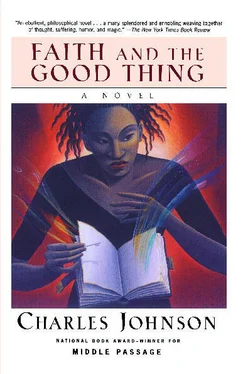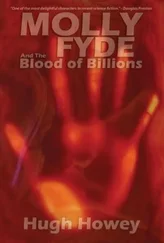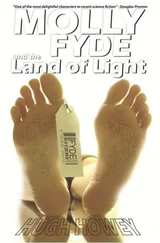Faith hurried, star-shaped snowflakes melting in her hair, trying to beat a snowstorm already clouding the morning, obscuring it with just the slightest tinge of mystery. She entered the lobby of Hotel Sinclair and found a folded note, scrawled in the large, nearly arthritic script of Mrs. Beasley, in her mailbox: you have a visitor.
Faith crumpled the note in her right hand. It could only be Tippis, coming to have his mind set at ease. She set her jaw, cursed him under her breath, and started climbing the stairs to the fourth floor, prepared to settle the issue as the Swamp Woman had for the Widow Thomas ten years ago. As it was told, the Widow Thomas’s husband died of drink, leaving her penniless and with enough unpaid bills to wallpaper her privy house. She traveled to the Swamp Woman’s shanty and offered the werewitch all her possessions — cheap jewelry, a spinning loom, small change, and two emaciated he-cats too sick to bristle if you yanked their tails — all in exchange for peace of mind.
“Gimme your mind,” the Swamp Woman said. They say she was sitting outside the shanty, mending the bridge over the bogs with nails made from human bones.
The Widow Thomas was startled. “How?”
The Swamp Woman drove in a nail with her bare black fist, laughed, and said, “Hand it over, and I’ll do what I kin for it.” She cackled as evilly as a fiend in a cloud. “If ya can’t find it, then there ain’t no problem, is there? Hee hee!”
But Tippis, Faith knew, was not so easily set at ease. She was certain he would lose his mind. Originally, he had told her he was a dentist, and this she believed. But thereafter he appeared at her door in a burgundy porter’s uniform, and the following week in a double-breasted suit, a briefcase filled with insurance forms at his side. After that he came peddling medical dictionaries. Of course, he explained: his license to practice dentistry was revoked for malpractice — taking advantage of an etherized girl spread out in his leather chair; his next job was as a porter, but he lost it for repeated insubordination. Yet still he tried, straining to situate himself in a world that resisted him at every turn. She remembered his coming to her with an armful of evening newspapers all opened to the want ads; he would cringe at every ad for a musician to play in a local band, throw up his hands finally, and groan, “Nobody wants me — they want accountants, salesmen, movie ushers, and male nurses, but not me !” His confessions were unbearable, and Faith told him on numerous occasions to show more strength, to resist the changes outside himself. She’d pleaded with him, told him every fine and noble tale she knew, because his problem, in part, was undeniably her own. That she was new and different each day was indisputable. It would be fitting to reintroduce herself to herself each morning when she stood before her mirror, saying, “Who am I today?” But Tippis’s changes were never from within, only catalyzed from without. Seeing him suffer so saddened her, because there was no end to his transformations, to his plastic personality first servile and groveling as a porter’s, then jocular and rapacious as a salesman’s. Who was he forced to be this time? Suppose he’d become a mortician’s assistant?
By the time Faith reached room 4-D she had worked up enough anger to shoot him. Mercy killing. She imagined buying a Saturday night special, raising it instantly at his head without aim, shooting — crack! crack! — and Tippis would be released. It was not morbidity that brought this on but the weariness she felt, acute now after her scaling of three flights of steps. Her joints felt as stiff as steel. She threw open the door to her room and stifled a scream. Sitting cross-legged on her bed, paring his ragged toenails with a tiny penknife and reading from a book, was a little man in a mauve-colored overcoat. Red-eyes. He, startled, too, scrambled to his feet and dropped the knife.
“Get out of here!”—Faith. She bolted back into the dark hallway, confused. Thinking: Surely it was too late to recover her money. He’d probably spent every penny, and in a single night at that, on liquor. But she could awaken everyone, call the police, file a charge.
“I’ve found you!” Red-eyes roared. He shuffled clumsily in his single shoe toward the door, sweating like a horse, and leaned in the doorjamb. He cried in a reedy voice, “I’ve looked and looked and—”
Spinning around, Faith pulled at the doorknob. She caught his right thumb between door and jamb. Red-eyes screamed. She pulled.
“Mercy!”
She pulled.
His bulbous thumb grew red. She heard something cracking like soft bone, or brittle wood, and pulled harder. Inside the room Red-eyes moaned.
“I hate you!” Faith shouted through the door. And, children, she meant it. Watching that twisted thumb swell was almost as satisfying as the sight of slavemasters burning in the inner circles of West Hell. She remembered vividly its rough and salty taste running along her gums — the texture of his skin, like coffee grounds; she thought of her miseries incurred since that first night in the city. And pulled.
Behind the door his broken voice warbled in choking, plaintive, pitiful cries. “ Mercy, child.!” Blood spurted from beneath his fingernail. He moaned like an old woman at a wake. “You must hear me — ou- open the door! ”
“Bullshit!” Faith shouted. She liked the sound of it; it made her feel evil, rebellious, because Big Todd had allowed no swearing in his house. It was a delicious word, and she sang it above his cries for “Mercy!” canceling them, because in all her months in Chicago she had seen no mercy, no love, no peace, no possibility of release. “Bull shit! ” It made her feel good.
“Please!”
Shivers ran along Faith’s skin. The moment of Justice was sour, stinking in her nose now with the loud smell of blood, of empty rebellion. Her stomach clenched, her head spun, and she could only hold the door shut by leaning backward on her heels. She heard choking behind it, which chilled her. It was like some hidden, supernatural agony on the other side of the world — unseen behind this wooden barrier, and hence not wholly real. The grief of ghosts. Only the bright, distended thumb disclosed his unseen suffering. Revenge was not worth this. Faith, sickened, released the door and stepped aside. Slowly it swung open, framing a frightened little man rocking back and forth on his knees. He held his thumb vertically, squeezing it, his nearly toothless mouth open. She guessed he was in shock of some sort, staring black-eyed and simpering in a long, low wail. Like wind outside a cabin window, his breath whistled through his teeth.
“Listen—” he broke off suddenly, hunkered on his haunches for a while, leaped to his feet, and flounced around the room, his watery eyes pinched together, his mouth hanging open like a stove lid. Faith forgot her thoughts of vengeance. She hurried to the sink, ran cold water to its brim, and said testily, “Stick your finger in here.”
Red eyes — turbid eyes anxious to communicate — opened. They seemed to bless her, to say the thousand silent things expressed by dogs and cats and cows when you treat them nicely. He plunged his hand into the water, winced—“Ah- ahhhh! ”—and watched the water suffuse with blood as bright as the Red Sea.
Begrudgingly, Faith said, “I’m sorry,” and stood quietly beside him, at least two heads taller than he, and studying his reflection in the mirror: a wasted, pock-marked face laced with day-old dirt and holes like craters in the moon; a flask-shaped body, obconical nose, and, on his right cheek, a rectangular red patch that must have been a birthmark or a burn. It appeared that he still wore the same mephitic clothes she remembered from their first encounter. He smelled as if this were indeed the case. He was, in no small measure, dissipated, probably dying from internal disorders of a terminal kind that wracked his withered form the day long. He was, in truth, so apparently beaten that he was beautiful. Like the grizzled, gimped old men she remembered in Georgia: bent of back, ill beyond succor, their dun-colored clothing shiny with dirt, their ashen eyes discolored and incapable of the visions of youth. They were not so much revolting as revelatory, not so much broken as bending, in a kind of grace, to the fate of all flesh.
Читать дальше












